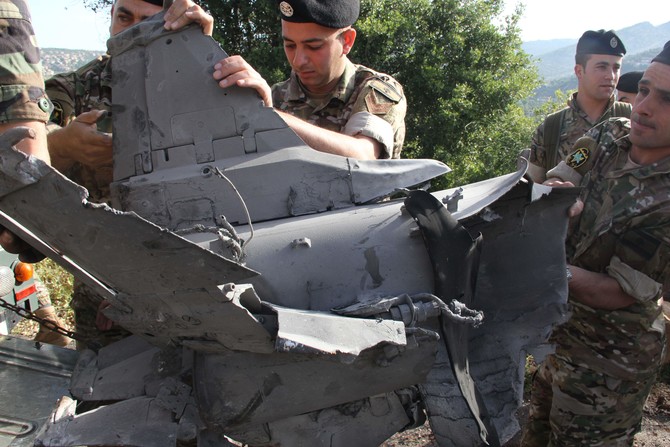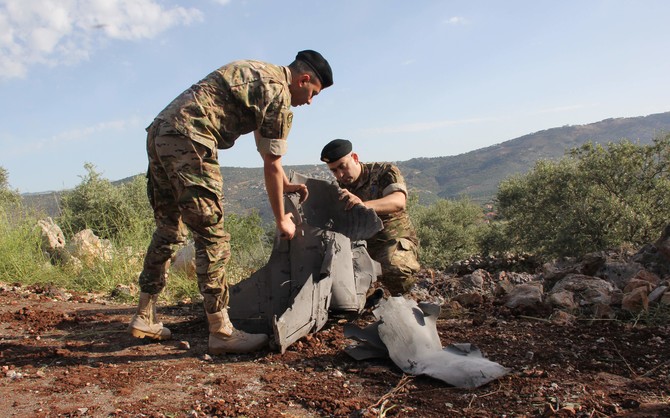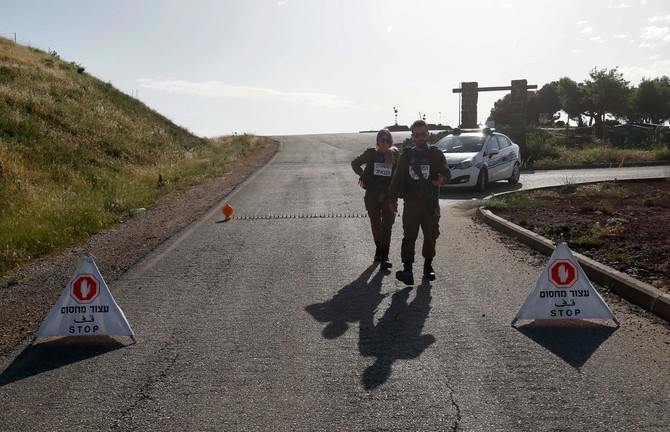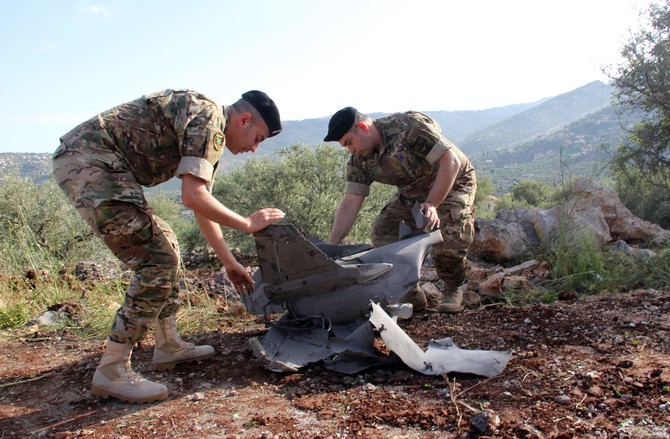LATEST
OPINION: Iran and Israel on the brink: What will stop them?
Israeli airstrikes have minimal impact, says Syrian monitoring group
Iran does not want 'new tensions' in the region: Rouhani
Russia seeks to take mediator role between Israel and Iran
Israeli PM: Israeli army will retaliate against any military action from Syria
UK warns against ‘further escalations’ between Iran and Israel
US condemns Iran’s ‘provocative rocket attacks’ from Syria
Bahrain: Israel has ‘right’ to respond to Iran
Britain condemns alleged Iranian attack in Golan
Syrian radar site destroyed as Israel hits back after Iranian rocket barrage
JERUSALEM/BEIRUT: Iranian forces in Syria launched a rocket attack on Israeli army bases in the Golan Heights early on Thursday, Israel said, prompting one of the heaviest Israeli barrages against Syria since the conflict there began in 2011.
The attack on the Israeli-occupied Golan Heights, just past midnight, marked the first time Iranian forces have hit Israel from Syria, where they have deployed along with Iran-backed Shiite militias and Russian troops to support President Bashar Assad in the country’s civil war.
Dozens of Israeli missiles hit a radar station, Syrian air defense positions and an ammunition dump, Syrian state media said, underscoring the risks of a wider escalation involving Iran and its regional allies.
“I hope we finished this chapter and everyone got the message,” Israeli Defense Minister Avigdor Lieberman said at the Herzliya security conference, near Tel Aviv, on Thursday morning.
Israel said 20 Iranian Grad and Fajr rockets were shot down by its Iron Dome air defense system or fell short of the Golan targets. The Quds Force, an external arm of Iran’s Revolutionary Guards, carried out the launch, Israel said.
“It was commanded and ordered by (Quds Force chief General) Qassem Soleimani and it has not achieved its purpose,” military spokesman Lt. Col. Jonathan Conricus told reporters.
Israel struck back by destroying dozens of Iranian military sites in Syria, Conricus said, as well as Syrian anti-aircraft units that tried unsuccessfully to shoot down Israeli planes.
“We do not know yet the (Iranian) casualty count,” he said.
“But I can say that in terms of our purpose, we focussed less on personnel and more on capabilities and hardware ... to inflict long-term damage on the Iranian military establishment in Syria. We assess it will take substantial time to replenish.”
Israeli schools in the Golan Heights opened as usual on Thursday morning, after sirens had sent residents to shelters during the night.
“I do not reside on the border of New Zealand-Australia. We are located here facing Syria and Lebanon and this is the reality which we will overcome together, especially with the IDF (Israel Defense Forces),” said Alex Gudish, a Golan settler.
Video: Reuters
International concerns over escalation
The US on Thursday condemned Iran’s “provocative rocket attacks” from Syria and supported Israel’s right to defend itself.
“The Iranian regime’s deployment into Syria of offensive rocket and missile systems aimed at Israel is an unacceptable and highly dangerous development for the entire Middle East,” the White House said in a statement. It said Iran’s Islamic Revolutionary Guard Corps “bears full responsibility for the consequences of its reckless actions.”
Britain condemned “in the strongest terms” the suspected Iranian rocket attack against Israeli positions in the Golan Heights. In a statement Thursday, Foreign Secretary Boris Johnson urged Iran to refrain from actions that could destabilize the region. Johnson also called on Russia to press the Syrian government, its ally, to work toward a broader political settlement. The UK has also warned against “further escalations” between Iran and Israel.
French President Emmanuel Macron called for a de-escalation of tensions in the Middle East.
“The president has been kept regularly updated. He calls for a de-escalation in the situation,” Macron's office said in a statement.
Macron will discuss the Middle East in a meeting with German Chancellor Angela Merkel later on Thursday, the Elysee said.
Later German Chancellor Angela Merkel said the latest escalation of hostilities was a matter of “war and peace” for the region.
“The escalation of the last hours show us that it’s really about war and peace,” said Merkel.
Russia also responded expressing its concerns over the growing military tensions between Israel and Iran.
Russia's Deputy Foreign Minister Mikhail Bogdanov was quoted on Thursday by TASS: “This is all very alarming, it causes concern. There should be work to de-escalate the tensions.”
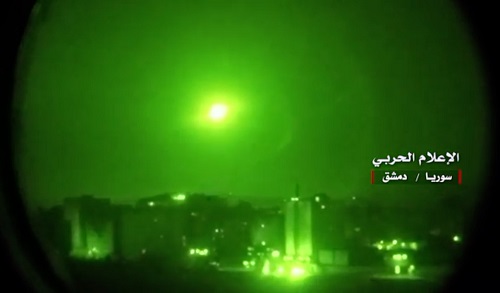
An image grab from "Central War Media" and broadcast on Syria's official TV image that appears to show air defenses intercepting Israeli missiles (AFP)
A top official from Bahrain said it is Israel’s “right” to defend itself after Israel launched overnight strikes on Iranian targets in Syria. Foreign Minister Khalid bin Ahmed Al-Khalifa wrote on Twitter Thursday that so long as Iran uses its forces and missiles to try and destabilize the region, “it is the right of any country in the region, including Israel to defend itself by destroying sources of danger.”
'Right decision'
The Israelis fear that Iran and its Lebanese ally Hezbollah are turning Syria into a new front against them. Israel says its occasional strikes in Syria aim to foil that.
Iran vowed retaliation after a suspected Israeli air strike last month killed seven of its military personnel in a Syrian air base.
Israel regards Iran as its biggest threat, and has repeatedly targeted Iranian forces and allied militia in Syria.
Expectations of a regional flare-up were stoked by US President Donald Trump’s announcement on Tuesday that he was withdrawing from the Iranian nuclear deal. Hours later, Israeli rocket rockets targeted a military base in Kisweh, a commander in the pro-Syrian government regional alliance said.
That attack killed 15 people, including eight Iranians, the Syrian Observatory for Human Rights said, though the commander said there were no casualties. Israel has neither confirmed nor denied responsibility.
The Trump administration cast its hard line against the Iranian nuclear deal as a response, in part, to Tehran’s military interventions in the region.
The Golan flare-up with Israel “is just further demonstration that the Iranian regime cannot be trusted and another good reminder that the president made the right decision to get out of the Iran deal,” White House press secretary Sarah Sanders told Fox News.
Russia warned
The tensions worry Russia, which wants to stabilize Syria.
Thursday’s flare-up came hours after Israeli Prime Minister Benjamin Netanyahu returned from a visit to Moscow, where he discussed Syria concerns with Russian President Vladimir Putin.
Conricus said Israel forewarned Russia of its strikes on Thursday, which Syrian state media first reported hit Baath City in Quneitra, near the border. Further waves of missiles followed. Syrian state media said Israeli missiles had been brought down over Damascus, Homs and Sueida.
“Air defenses confronted tens of Israeli rockets and some of them reached their target and destroyed one of the radar sites,” Syrian state news agency SANA reported, citing a military source. Another rocket hit an ammunition warehouse, it said.
Syrian state television broadcast footage of its air defenses firing, and playing patriotic songs. Damascus residents described explosions in the sky from air defense systems.
Lebanon’s National News Agency reported Israeli jets circling over Lebanese territory early on Thursday before exiting.




